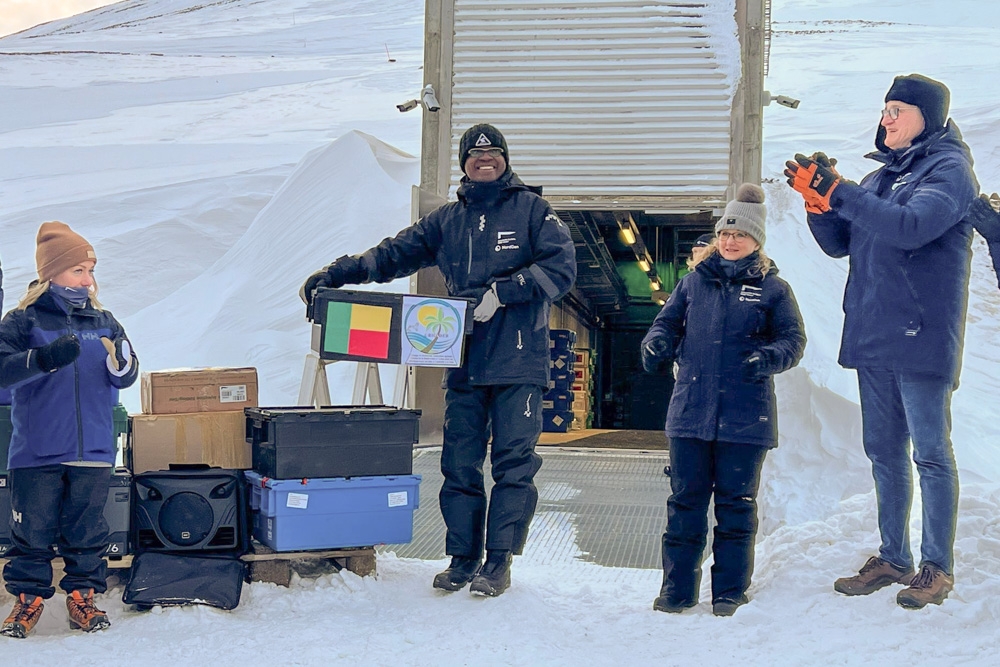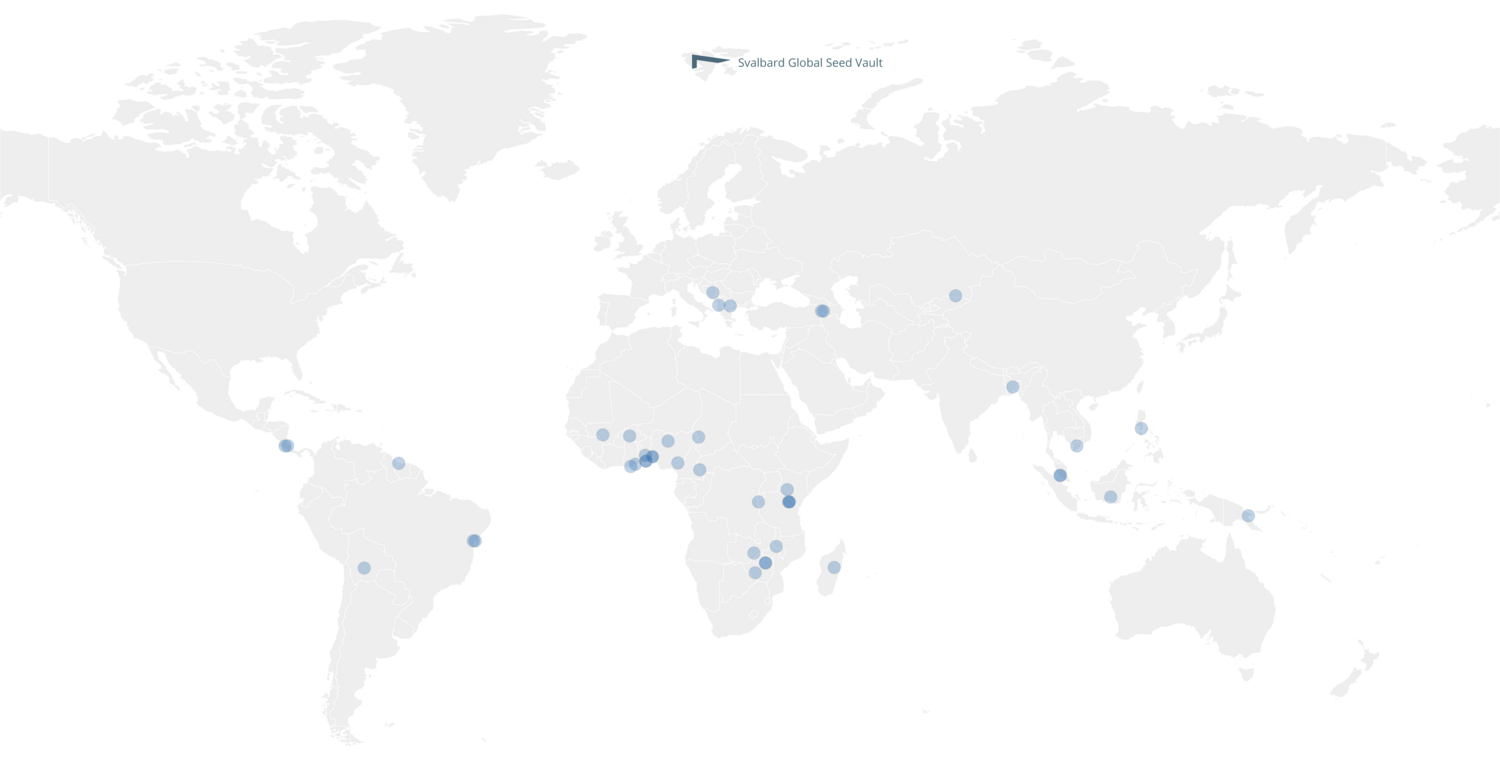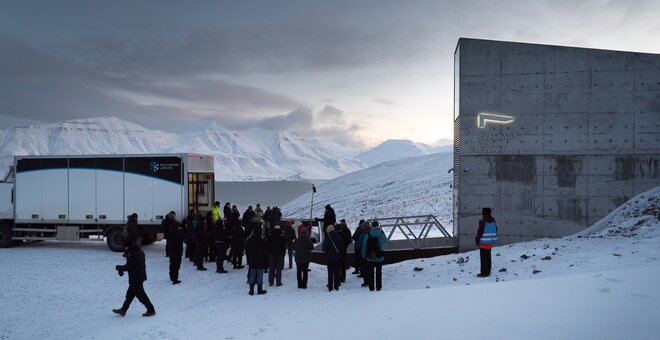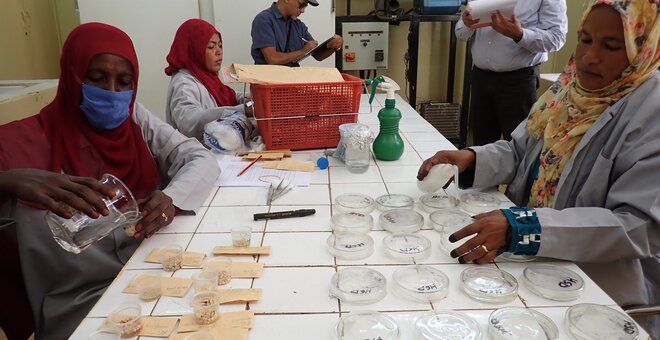Safety Duplication at Svalbard Global Seed Vault
Keeping crop diversity in a genebank is an important first step in ensuring that diversity is preserved and available to plant breeders, farmers and others. But keeping seeds in only one place is also a major risk — if anything goes wrong, the whole collection can be lost.
What is it and where did it come from?
Genebanks are expected to have what is called a safety duplicate of their collection, preferably in a different geographic location. Producing these safety duplicates requires growing out the samples, harvesting, cleaning and processing the resultant seed and preparing it for long-term cold storage. Unfortunately, this is time-consuming, labor intensive and expensive. Many genebanks simply do not have the resources to do this crucial work. This means that many crop diversity collections around the world are not safety duplicated and their collections could easily be lost.
To address this, BOLD is providing grants that will deliver technical and financial support to 42 partners around the world to help them regenerate seeds from their key collections and to back them up both at another genebank and send them to the Svalbard Global Seed Vault for long-term safekeeping.
The grants focus on crops listed in Annex 1 of the International Treaty for Food and Agriculture, as well as those of national and regional significance. Grantees will regenerate and conserve a wide range of crops, from common staples such as wheat and rice to indigenous vegetables, underutilized crops and crop wild relatives — all of which will help ensure future food security.
Backing up this key crop diversity from low- and middle-income countries will ensure its continued availability to farmers, breeders and researchers.

Innocent Dossou Aminon, from the NGO GRIGADEB in Benin, was supported by BOLD and deposited 427 accessions of seven crops in February 2023.
Grantees of the BOLD regeneration grants
With the support of the BOLD project, 42 partners can now regenerate seeds from their collections and both back them up at another genebank and send them to the Svalbard GlobalSeed Vault for long-term safekeeping.


AFRICA
Benin
- Group of Research, Agricultural Innovation, Biodiversity Management and Action for Sustainable and Equitable Local Development (GRIGADEB)
- Laboratory of Genetics, Biotechnology and Seed Science of the Faculty of Agronomic Sciences of the University of Abomey-Calvi (FSA-UAC)
- National Institute of Agricultural Research (INRAB)
Burkina Faso
- Institute of Environment and Agricultural Research of Burkina Faso (INERA)
Burundi
- Institut des Sciences Agronomiques du Burundi (ISABU)
Cameroon
- Eco Germ Farmers
Chad
- Institut Tchadiende Recherche Agronomique pour le Dévelopment (ITRAD)
Democratic Republic of Congo
- Institut National por l’Etude et la Recherche Agronomiques (INERA)
Ghana
- University of Cape Coast (UCC)
Kenya
- Seed Savers Network, Kenya (SSN)
Madagascar
- The National Center for Applied Research on Rural Development (FOFIFA/CENRADERU)
Malawi
- Malawi Plant Genetic Resources Centre (MPGRC)
Mali
- Institute of Rural Economy (IER-SRA Cinzana)
Nigeria
- Ahmadu Bello University (ABU)
- National Horticultural Research Institute (NIHORT)
- Biodiversity Education and Resource Centre (BERC)
- Department of Agronomy, Osun State University (UNIOSUN)
Tanzania
- Tanzania Agricultural Research Institute, Kihinga Center (TARI), Kihinga Center
- Tanzania Agricultural Research Institute, Kihinga Center (TARI), Uyole Center
- The Nelson Mandela African Institution of Science and Technology (NMAIST)
Zambia
- Zambia Agriculture Research Institute (ZARI)
Zimbabwe
- Genetic Resources and Biotechnology Institute, Zimbabe (GRBI)
- Lupane State University (LSU)
- Community Technology Development Trust (CTDT)
ASIA AND OCEANIA
Armenia
- The Scientific Center of Vegetable and Industrial Crops of the Ministry of Economy of Armenia (SCVIC)
- Scientific Center of Agrobiotechnology (SCA)
Bangladesh
- Bangladesh Rural Advancement Committee (BRAC)
Indonesia
- The Borneo Institute (BIT)
Kazakhstan
- Kazakh Scientific Research Institute of Agriculture and Plant Growing
Malaysia
- Malaysian Agricultural Research and Development Institute, Malaysia (MARDI)
Papua New Guinea
- The PNG National Agricultural Research Institute (NARI)
Philippines
- National Plant Genetic Resources Laboratory (NPGRL), Institute of Plant Breeding, College of Agriculture and Food Sciences, University of the Philippines Los Banos
Vietnam
- College of Agriculture and Applied Ecology, Can Tho University (CTU) Central and South America
CENTRAL AND SOUTH AMERICA
Bolivia
- Instituto de Agroecología y Seguridad Alimentaria, Bolivia (IASA)
Brazil
- Brazilian Agricultural Research Corporation (Embrapa) Maize and Sorghum
- Brazilian Agricultural Research Corporation (Embrapa) Rice and Bean
Costa Rica
- Universidad de Costa Rica (UCR)
- Tropical Agronomic Research and High Education Center (CATIE)
Suriname
- Anne van Dijk Rice Research Centre Nickerie (ADRON)
EUROPE
Albania
- Institute of Plant Genetic Resources of Albania (IPGRA)
Bosnia and Herzegovina
- University of Sarajevo, Faculty of Agriculture and Food Sciences
North Macedonia
- Civil Association FABIA CSB Bogdanci
*All of the recipients are on the Organisation for Economic Co-operation and Development’s Development Assistance Committee’s list of countries eligible for official development assistance. They also comply with other criteria, including being contracting parties to the International Treaty on Plant Genetic Resources for Food and Agriculture (the Plant Treaty) and make their seed samples available under the Plant Treaty’s Standard Material Transfer Agreement.
Related stories
Celebration Meets Urgency at Latest Seed Vault Opening in Svalbard
LONGYEARBYEN, NORWAY, 22 October 2025 – Twenty genebanks representing every continent bar Antarctica deposited more than 21,000 seed samples to the Svalbard Global Seed Vault this week. Among them were new contributors from the...
22 Oct 2025
Heritage and Health Take Center Stage at the Latest Svalbard Global Seed Vault Deposit
As genebanks around the world deposit seed samples in the Svalbard Global Seed Vault this week, the focus is on how crop diversity reflects cultural heritage.
LONGYEARBYEN, NORWAY, 3 June 2025 – Fourteen genebanks will deposit...
3 Jun 2025
Sudan’s National Genebank Begins Rebuilding as Famine Threatens
Staff count the cost of armed conflict and step up efforts to conserve Sudan’s unique collection of sorghum and other crops.
Almost two years after Sudan’s civil war broke out, the northeast African nation is experiencing one of...
13 Mar 2025




